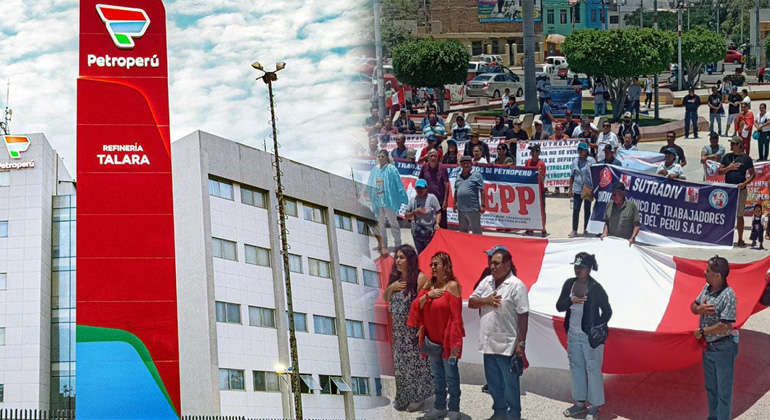
With information from Luis Coello
Dozens of citizens and workers of Petroperu They marched in Talara to question the recent actions of Congress and the Executive Branch regarding the state company: the congressman Alejandro Cavero seeks to privatize it and the management of Dina Boluarte will no longer directly deliver lots I, VI and Z-69, but will instead launch a public tender under pressure from business associations.
Elder Ruiz, corporate manager of the New Talara Refinery (NRT), pointed out that Petroperú “belongs to all Peruvians” and they will work to recover the lots until they even participate in the sale through tapsso they expect civil support, especially from the Talara authorities.
For his part, Arturo Rodríguez, manager of the Talara Refinery Project department, assured that Petroperú has the capacity and competence to manage the lots and the NRT, as the State has been demonstrating in Lot I – temporarily for two years. “We are ready to strengthen vertical integration that will benefit everyone,” he said.
The problem is political and comes from Congress
Regarding Alejandro Cavero’s initiative to privatize Petroperú, they consider that it is riddled with “inconsistencies.” “They say that Petroperú is bankrupt, but the next day they want to buy shares. If Petroperú is worthless, why do they want it? “They only seek to cannibalize Petroperú for economic interests.”said Johnny Villón, general secretary of the National Union of Petroleum Professionals of Peru.
Manuel Mendoza, a veteran trade unionist from Talar, argues that they are facing a political problem that comes from Congress, so it is key to mobilize to “put things in their place.” “For 50 years we fought against Brea and Pariñas, so that Fujimori arrives and breaks the 2 to 1 scheme: for one barrel in process, two would be in reserve,” he noted.
Finally, Luis Querevalú, representative of the Unified National Union of Employees and Administrative Workers of Petroleum of Peru, points out that lots I, VI and Z-69 that Petroperú will temporarily assume for two years “after the turnaround of Boluarte”—and then pass to be tendered—will have net profits of US$250 million annually.
“They (private companies) have had the oil income, even when a barrel cost $140. They benefited to the detriment of the economy. There was no social investment in Talara. They claimed that with privatization there would be an increase in reserves, production and jobs, but nothing has happened. We went from 140 thousand barrels per day to 35 thousand. Employment with outsourced workers became precarious,” he objected.
Source: Larepublica
Alia is a professional author and journalist, working at 247 news agency. She writes on various topics from economy news to general interest pieces, providing readers with relevant and informative content. With years of experience, she brings a unique perspective and in-depth analysis to her work.












